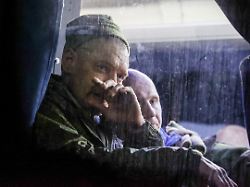Prisoners of war regret deployment
“We realize we’re not the good guys”
06/18/2023 11:59 am
During their counter-offensive, Ukrainian troops arrest many Russian soldiers. In a report, they confirm rumors of Russian blockade squads and other inhumane practices by the Russian military leadership. They want to avoid an exchange of prisoners – for fear of their compatriots.
Everything was quiet for two days, then the attack suddenly began near Welyka Novosilka – a small town located almost 100 kilometers southwest of Donetsk in eastern Ukraine. “It was chaotic,” says Anatoly. “There was shooting everywhere, everyone ran. I tried to find the enemy in the field in front of us, but I couldn’t see anyone. A few minutes later, Ukrainians stormed our position and threw grenades into our trench. I got up and said ‘I give up! I give up!’ called.”
Five other men in the ditch are already dead at this point. Among them is his good friend Georgi, as Anatoli explains. He fought for the Russian army in Ukraine and was arrested by Ukrainian units a few days ago. In the “Wall Street Journal” he and other prisoners of war report on their experiences. Journalists from the US newspaper visited them in a temporary POW camp in the Ukrainian city of Kramatorsk, not far from the front lines. The reporters speak of a steady stream of new prisoners arriving there every day.
Different origins, similar reports
According to the Wall Street Journal, the detainees included regular soldiers from the Russian army, as well as conscripts and mercenaries. Many of them therefore belong to Russian minorities from Siberia. Among them are residents of the Russian Baltic Sea metropolis of St. Petersburg and the city of Vladivostok on the other side of the country on the Pacific.
The men’s origins are as different as their statements are similar: they describe the morale of the Russian troops as poor, their own lives as obviously unnecessary and themselves as victims of Russian propaganda.
“We were told that Ukraine is bad. The people here are supposed to be Nazis. We heard that everywhere,” says Anatoly, who worked as a construction worker in southern Siberia before volunteering for the Russian army to serve in the country neighboring country reported. Many friends and acquaintances would have done that.
“They shoot us!”
Anton also went to war voluntarily, as he reports. Unlike Anatoly, however, he belonged to the “Storm Z” paramilitary unit, which consists mainly of prisoners: Anton was recruited for the war in prison and lured with the prospect of a pardon if he fought in Ukraine for six months. The former soldier was in prison for drug trafficking.
According to him, it is doubtful that Anton could ever have returned to Russia as a free man. As early as March, he was so badly injured by shrapnel on his limbs and head that a doctor found him unfit for work. His commander nevertheless sent him and other wounded fighters back to the front, he tells the Wall Street Journal.
The tactical retreat was also said to have been forbidden by their commanders: so-called blocking squads with orders to shoot were waiting behind them. After being hit by Ukrainian bullets first in the leg and then in the arm at Welyka Novosilka, Anton gave up anyway. “If we go back, they’ll shoot us!” he claims to have called out to the Ukrainian units. In captivity, he says he’s now beginning to realize “that we’re not on the good side in this war.”
“No one came”
The life of conscript Dmitri from Russia’s Far East does not seem to have meant very much to his commanders either. He describes his unit, which was stationed south of Welyka Nowosilka, as poorly trained and equipped. He received only brief weapons and first aid training before being sent to the front lines. Once there, there would have been a lack of crews for tanks and other heavy equipment. And also his replacement: “At some point we found in our documents that we should have been replaced a month ago, but nobody came.”
Most of the Russian prisoners of war are not supposed to stay in Ukraine for long. The Ukrainian military wants to exchange them for their own troops that are in Russian captivity as soon as possible. Fighters like Dmitri want to prevent that if they can: they fear that Russian security forces like the domestic secret service FSB could punish them or kill them if they return alive from Ukraine.
